- Home
- Sue Grafton
A is for ALIBI Page 12
A is for ALIBI Read online
Page 12
I found Greg Fife in a little gray humpbacked camper outside Durmid on the eastern shore of the Salton Sea. It had taken me a while to track him down. Gwen had said that he lived on his boat but the boat had been pulled out of the water for paint and repair and Greg was temporarily lodged in an aluminum trailer that looked like a roly-poly bug. The interior was compact with a folding table hooked flat against the wall, a padded bench that became a single bed, a canvas chair that completely blocked passage to the sink, a chemical toilet, and a hot plate. He opened two bottles of beer, which he’d taken from a refrigerator the size of a cardboard box, located under the sink.
He offered me the padded bench, unfolding the small table between us. A single leg flopped down to give it support. I was effectively hemmed in and could only get comfortable by turning sideways. Greg took the canvas chair, tilting back so he could study me while I studied him. He looked a lot like Laurence Fife ��� lank dark-brown hair, a square-cut smooth face that was clean-shaven, dark eyes, bold dark brows, square chin. He looked younger than twenty-five but his smile had the same touch of arrogance that I remembered from his father. He was darkly tanned, cheekbones tinted with sunburn. His shoulders were wide, his body lean, his feet bare. He wore a red cotton turtleneck and cutoffs that were ragged at the bottom, nearly ruffled with bleached threads. He took a sip of beer.
“You think I look like him?”
“Yes,” I said. “Does that suit you?”
Greg shrugged. “Doesn’t matter much at this point,” he said. “We weren’t anything alike.”
“How so?”
“God,” he said facetiously, “let’s just skip over the preliminaries and get right down to the personal stuff, why don’t we.”
I smiled. “I’m not very polite.”
“Neither am I,” he said.
“So what do you want to talk about first? The weather?”
“Skip it,” he said. “I know what you’re here for so get to the point.”
“You remember much about that time in your life?”
“Not if I can help it.”
“Except for shrinks,” I suggested.
“I did that to please my mom,” he said and then smiled briefly as though he recognized the fact that the phrase “my mom” sounded too boyish for him at his age.
“I worked for your father a couple of times,” I said.
He began to peel a strip of label with his thumbnail, feigning disinterest. I wondered what he’d heard about his father and I decided, on impulse, not to give Laurence Fife any posthumous pats lest I sound condescending or insincere.
I said, “I’ve heard he was a real bastard.”
“No shit,” Greg said.
I shrugged. “I didn’t think he was that bad myself. He was straight with me. I suspect he was a complicated man and I don’t think many people got close to him.”
“Did you?”
“No,” I said. I shifted slightly in my seat. “How’d you feel about Nikki?”
“Not that good.”
I smiled. “Try to keep your answers short so I can get ‘em on one line,” I said. He didn’t bite. I drank beer for a while, then rested my chin on my fist. Sometimes I just really do get sick of trying to coax information out of people who aren’t in the mood. “Why don’t you fold up the table and we’ll go outside,” I said.
“What for?”
“So I can get some fresh air, fucker, what do you think?”
He chuckled suddenly and moved his long legs out of my way as I slid out of the seat.
I’d surprised myself, getting snappish with him, but I get tired of people being cute or sullen or cautious or tight-lipped. I wanted straight answers and a lot of them too. And I wanted a relationship based, just once, on some sort of mutual exchange instead of me always having to connive and manipulate. I walked aimlessly, Greg at my heels, trying to cool myself down. It wasn’t his fault, I knew, and I’m suspicious of myself anyway when I’m feeling righteous and misunderstood.
“Sorry I snapped at you,” I said.
The trailer was about two hundred yards from the water’s edge. There were several larger trailers nearby, all facing the sea, like a queer band of animals that had crept down to the water to drink. I pulled off my tennis shoes and tied the laces together, banging them around my neck. The Salton Sea has a mild to nonexistent surf, like an ocean that has been totally tamed. There is no vegetation visible in the water and few if any fish. It gives the shore a curious air, as though the tides had been brought to heel, becalmed, the life forms leeched away. What remains is familiar but subtly changed, like a glimpse into the future where certain laws of nature have been altered by the passage of time. I placed a drop of water on my tongue. The taste of salt was fierce. “Is this ocean water?”
Greg smiled, apparently unperturbed by my former outburst. In fact he seemed friendlier. “You want a lesson in geology,” he said, “I’ll give you one.” It was the first time his voice had contained any sign of enthusiasm.
“Sure, why not?”
He picked up a rock, using it like a piece of chalk as he drew a crude map in the wet sand. “This is the California coastline and this is Baja. Over here is Mexico. Right at the tip of the Gulf of California is Yuma ��� southeast of here, more or less. This is us here,” he said, pointing. “The Colorado River curves right up through here and then up past Las Vegas. That’s Hoover Dam. Then it goes up here and over into Utah and then to Colorado, but we can skip that part. Now,” he said, tossing the rock aside. He began to draw with his fingertip, glancing up at me to see if I was listening. “This area in here is called the Salton Sink. Two hundred and seventy-three feet below sea level ��� something like that. If it weren’t for the Colorado River forming a kind of natural dam right here, all this water from the Gulf of California would have spilled into the Salton Sink years ago ��� all the way up to Indio. God, that gives me the willies when I think of it. Anyway, the Salton Sea came from the Colorado River itself, so it was originally fresh water. Overflowed in 1905 ��� the river did, billions of gallons of water pouring in over a two-year period. It was finally controlled with rock and brush dams. The salt, which has been gradually saturating the water, was probably from prehistoric times when all of this area was submerged.” He stood up, brushing wet sand off his hands, apparently satisfied with his summary.
We began to walk ��� he on the beach side, me scuffling my bare feet through the shallows. He tucked his hands in his back pockets. “Sorry if I was a pissant before,” he said lightly, “I’ve been in a bad mood with my boat out of the water. I was never meant to be on land.”
“You sure snapped out of it quick enough,” I remarked.
“Because you said ‘fuck.’ I always get tickled when women say that. Especially you. It was the last thing I expected to come out of your mouth.”
“What do you do down here?” I asked. “Fish?”
“Some. Mostly sail. Read. Drink beer. Hang out.”
“I’d go nuts.”
Greg shrugged. “I started out nuts so I’m getting sane.”
“Not really ‘nuts,”’ I said.
“Not certifiable, no.”
“What kind then?”
“Don’t make me tell that stuff,” he said mildly. “I get bored with myself. Ask me something else. Three questions. Like magic wishes.”
“If I have to limit myself to three questions, I might as well go home,” I said, but basically I was willing to play the game. I looked over at him. He was looking less like his father and more like himself. “What do you remember from the period just before he died?”
“You asked me that before.”
“Yeah, and that’s just about the time you turned all surly on me. I’ll tell you why I’m asking. Maybe that will help. I’d like to reconstruct the events just before his death. Maybe as far back as the last six months before he was killed. I mean, maybe he was involved in some kind of legal hassle ��� a personal feud. Maybe
he fought with a neighbor over a property line. Somebody did it, and there had to be a sequence of events.
“I wouldn’t know about that stuff,” he said. “I can tell you just family events, but the other I wouldn’t know.”
“That’s okay.”
“We came down here that fall. That’s one of the reasons I came back.”
I wanted to prompt him with another question but I was afraid he’d count it as one of my three so I kept my mouth shut. He went on.
“I was seventeen. God, I was such a jerk and I thought my father was so impossibly perfect. I didn’t know what he expected of me but I figured I’d never measure up, so I was a pissant. He was supercritical and he hurt my feelings a lot, but I’d just stonewall him. Half the time I hung on his every word and the rest of the time I hated his guts. So when he died, I lost the chance to square myself with him. I mean, for all time, you know? That’s it. I’ve got no way to take care of any old business with him, so I’m stuck. I figured if I was stuck in time, I might as well be stuck in place, too, so that’s why I came here. We were out on the beach once and he had to go back to the car for something and I remember watching him walk. Just looking at him. He had his head bent and he was probably thinking about anything but me. I felt like I should call him back, really tell him how much I loved him, but of course I didn’t. So that’s the way I remember him. That whole business really screwed me up.”
“It was just the two of you?”
“What? No, the whole family. Except Diane. She got sick and stayed with Mom. It was Labor Day weekend. We drove to Palm Springs, first, just for the day, and then came on down here.”
“How’d you feel about Colin?”
“Okay I guess, but I didn’t see why the whole family had to revolve around him. The kid had a handicap and I felt bad about that, but I didn’t want my life to focus on his infirmity, you know? I mean, Jesus, I would have had to develop a terminal disease to compete with him. This is me at seventeen, you understand. Now I’m a little more compassionate, but back then, I couldn’t cope with that stuff. I didn’t see why I should. Dad and I were never bosom buddies, but I needed time with him too. I used to have these fantasies of what it would be like. I’d really tell him something important and he’d really listen to me. Instead, all we talked about was bullshit just bullshit. So six weeks later he’s dead.”
He glanced at me and then shook his head, smiling sheepishly.
“Shakespeare should have done a play about this stuff,” he said. “I could have done the monologue.”
“So he never talked to you about his personal life?”
“That’s number three, you know,” he remarked. “You sneaked in that little question about whether it was just Dad and me down here. But the answer is no. He never talked to me about anything. I told you I couldn’t be much help. Let’s knock it off for a while, okay?”
I smiled and tossed my shoes up on the beach, starting to jog.
“Do you jog?” I called back over my shoulder.
“Yeah, some,” he said, catching up. He began to trot at my side.
“What happens if I work up a sweat?” I asked. “Can we get cleaned up?”
“The neighbors let me use their shower.”
“Great,” I said and picked up the pace.
We ran, not exchanging a word, just taking in sun and sand and dry heat. The whole time, the same question came up over and over again. How could Sharon Napier fit into this scheme? What could she possibly have known that she didn’t live long enough to tell? So far, none of it made sense. Not Fife’s death, not Libby’s, not Sharon’s death eight years later. Unless she was blackmailing someone. I glanced back at the little trailer, still visible, looking remarkably close in the odd perspective of the flat desert landscape. There was no one else around. No sign of vehicles, no boogeymen on foot. I smiled at Greg. He wasn’t even panting yet.
“You’re in good shape,” I said.
“So are you. How long do we keep this up?”
“Thirty minutes. Forty-five.”
We chunked along for a while, the sand causing mild pains in my calves.
“How about I ask you three?” he said.
“Okay.”
“How’d you get along with your old man?”
“Oh great,” I said. “He died when I was five. Both of them did. In a car wreck. Up near Lompoc. Big rock rolled down the mountain and smashed the windshield. Took them six hours to pry me out of the back. My mother cried for a while and then she stopped. I still hear it sometimes in my sleep. Not the sobs. The silence after that. I was raised by my aunt. Her sister.”
He digested that. “You married?”
“Was. ” I held up two fingers.
He smiled. “Is that for ‘twice’ or question number two?” I laughed. “That’s number three.”
“Hey come on. You cheat.”
“All right. One more. But make it count.
“You ever kill anyone?”
I glanced over at him with curiosity. It seemed like a strange follow-up. “Let’s put it this way,” I said. “I did my first homicide investigation when I was twenty-six. A job I did for the public defender’s office. A woman accused of killing her own kids. Three of them. Girls. All under five. Taped their mouths, hands, and feet, then put them in garbage cans and let them suffocate. I had to look at the glossy eight-by-ten police photographs. I got cured of any homicidal urges. Also any desire for motherhood.”
“Jesus,” he said. “And she really did it?”
“Oh sure. She got off, of course. Pleaded temporary insanity. She might be back on the streets again for all I know.
“How do you keep from getting cynical?” he asked.
“Who says I’m not?”
While I showered in the trailer next door, I tried to think what else I might learn from Greg. I was feeling restless, anxious to be on the road again. If I could get to Claremont by dark, I could talk to Diane first thing in the morning and then drive back to Los Angeles after lunch. I toweled my hair dry and dressed. Greg had opened another beer for me, which I sipped while I waited for him to get cleaned up. I glanced at my watch. It was 3:15. Greg came into the trailer, leaving the door open, sliding the screen door shut. His dark hair was still damp and he smelled of soap.
“You look poised for flight,” he said, getting himself a beer. He popped the cap.
“I’m thinking I should try to get to Claremont before dark,” I said. “You have any messages for your sister?”
“She knows where I am. We talk now and then, often enough to keep caught up,” he said. He sat down in the canvas chair, propping his feet up on the padded bench next to me. “Anything else you want to ask?”
“Couple of things if you don’t mind,” I said.
“Fire away.”
“What do you remember about your father’s allergies?”
“Dogs, cat dander, sometimes hay fever but I don’t know what that consisted of exactly.”
“He wasn’t allergic to any kind of food? Eggs? Wheat?”
Greg shook his head. “Not that I ever heard. Just stuff in the air ��� pollens, things like that.”
“Did he have his allergy capsules with him when the family came down here that weekend?”
“I don’t remember that. I would guess no. He knew we’d be out in the desert and the air down here is usually pretty clear even in late summer, early fall. The dog wasn’t with us. We left him at home, so Dad wouldn’t have needed the allergy medication for that, and I don’t think there was anything else he needed it for.”
“I thought the dog got killed. I thought Nikki told me that,” I said.
“Yeah, he was. While we were gone as a matter of fact.”
I felt a sudden chill. There was something odd about that, something off. “How’d you find out about it?”
Greg shrugged. “When we got home,” he said, apparently not attaching much to the fact. “Mom had taken Diane over to the house to pick something up. Sunday mor
ning I guess. We didn’t get back until Monday night. Anyway, they found Bruno lying out on the side of the road. I guess he was pretty badly mangled. Mom wouldn’t even let Diane see him up close. She called the animal-shelter people and they came and picked him up. He’d been dead awhile. All of us felt bad about it. He was a great beast.”
“Good watchdog?”
“The best,” he said.
“What about Mrs. Voss, the housekeeper? What was she like?”
“Nice enough, I guess. She seemed to get along with everybody,” he said. “I wish I knew more but that’s about it as far as I can tell.”
I finished my beer and got up, holding out my hand to him. “Thanks, Greg. I may need to talk to you again if that’s okay.”
He kissed the back of my hand, pretending to clown but meaning something else, I was almost sure. “Godspeed,” he said softly.
I smiled with unexpected pleasure. “Did you ever see Young Bess? Jean Simmons and Stewart Granger? That’s what he says to her. He was doomed, I think, or maybe she was ��� I forget. Ripped my heart out. You ought to watch for it on the late movie some night. It killed me when I was a kid.”

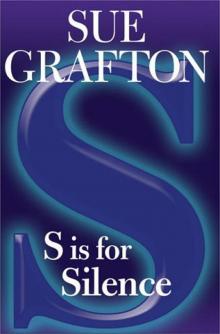 S Is for Silence
S Is for Silence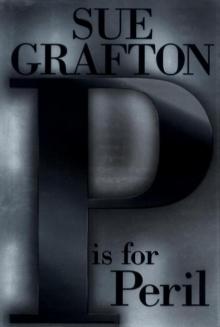 P Is for Peril
P Is for Peril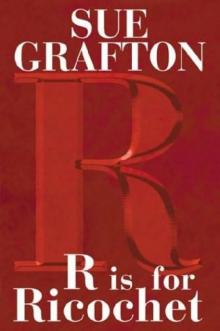 R Is for Ricochet
R Is for Ricochet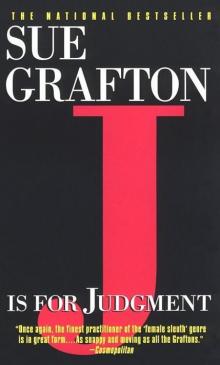 J Is for Judgment
J Is for Judgment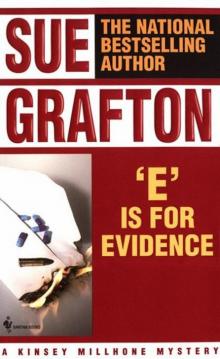 E Is for Evidence
E Is for Evidence T Is for Trespass
T Is for Trespass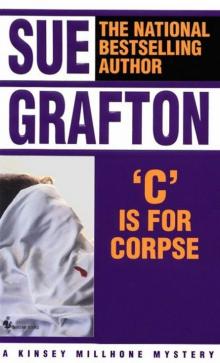 C Is for Corpse
C Is for Corpse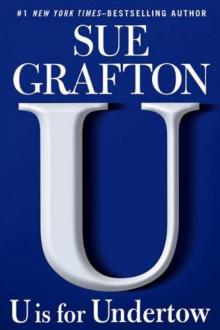 U Is for Undertow
U Is for Undertow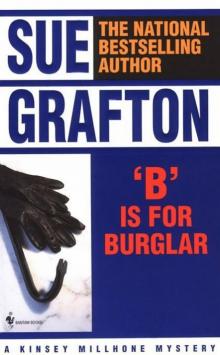 B Is for Burglar
B Is for Burglar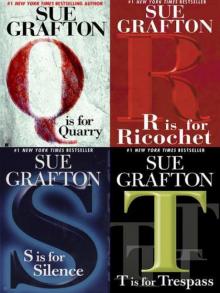 Four Sue Grafton Novels
Four Sue Grafton Novels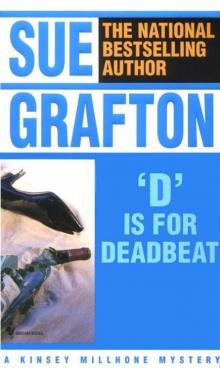 D Is for Deadbeat
D Is for Deadbeat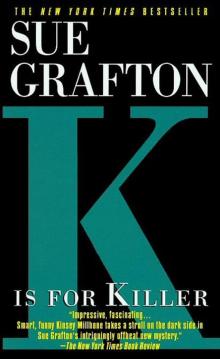 K Is for Killer
K Is for Killer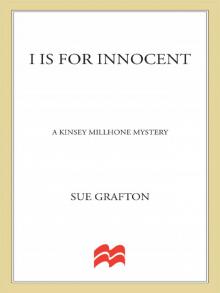 I Is for Innocent
I Is for Innocent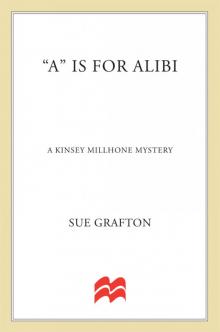 A Is for Alibi
A Is for Alibi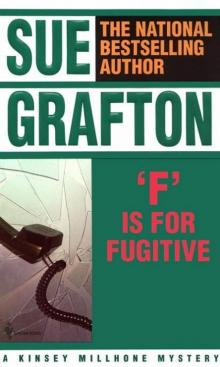 F Is for Fugitive
F Is for Fugitive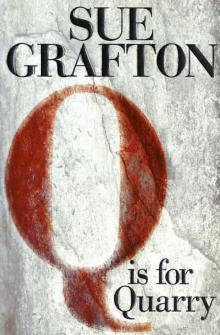 Q Is for Quarry
Q Is for Quarry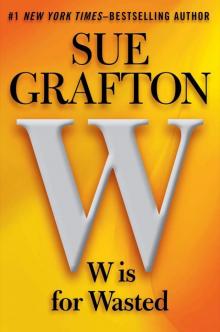 W Is for Wasted
W Is for Wasted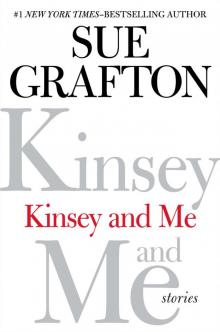 Kinsey and Me: Stories
Kinsey and Me: Stories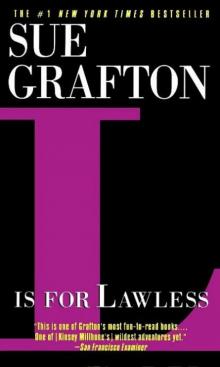 L Is for Lawless
L Is for Lawless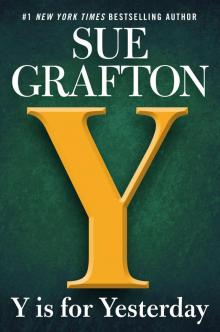 Y Is for Yesterday
Y Is for Yesterday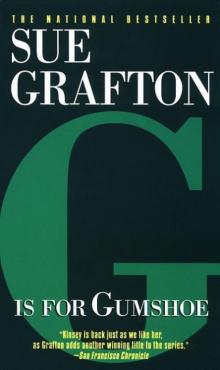 G Is for Gumshoe
G Is for Gumshoe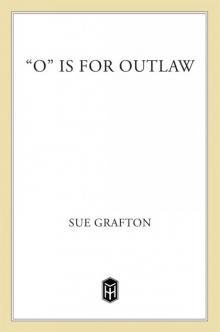 O Is for Outlaw
O Is for Outlaw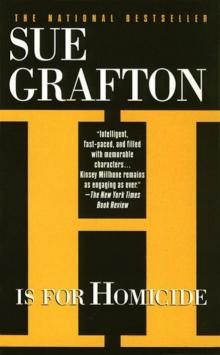 H Is for Homicide
H Is for Homicide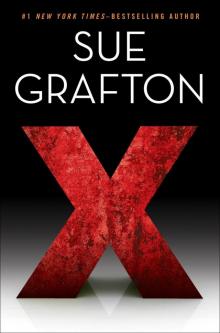 X
X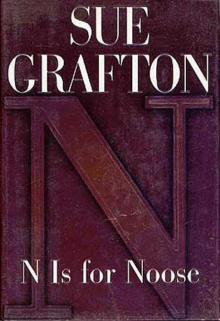 N Is for Noose
N Is for Noose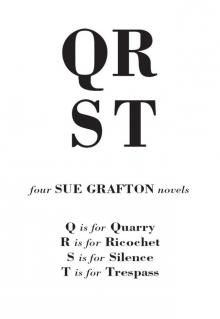 Three Complete Novels: A Is for Alibi / B Is for Burglar / C Is for Corpse
Three Complete Novels: A Is for Alibi / B Is for Burglar / C Is for Corpse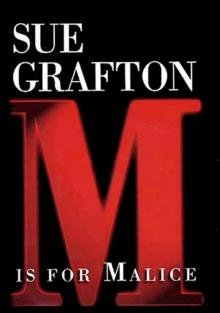 M Is for Malice
M Is for Malice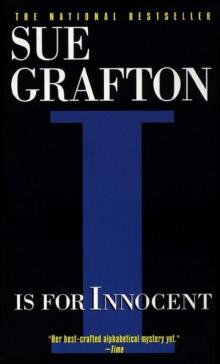 I is for INNOCENT
I is for INNOCENT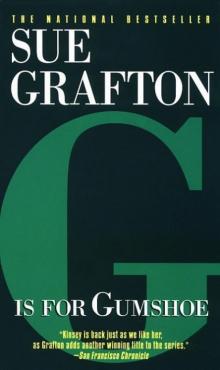 G is for GUMSHOE
G is for GUMSHOE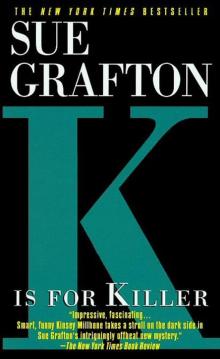 K is for KILLER
K is for KILLER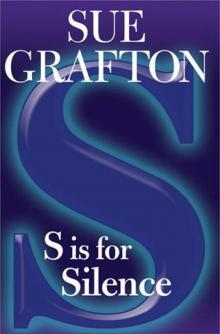 S is for SILENCE
S is for SILENCE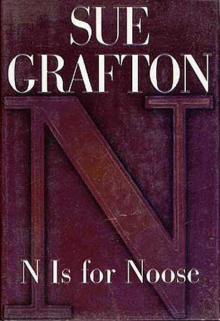 N is for NOOSE
N is for NOOSE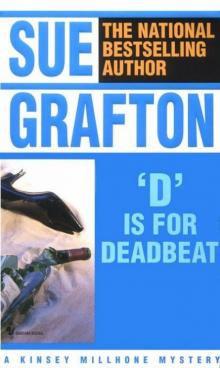 D is for DEADBEAT
D is for DEADBEAT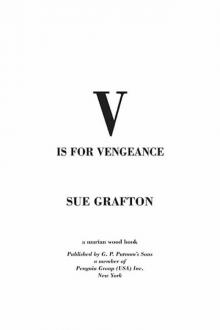 V is for Vengeance
V is for Vengeance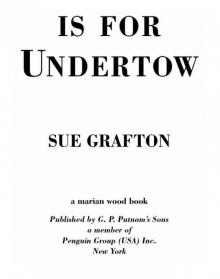 U is for Undertow
U is for Undertow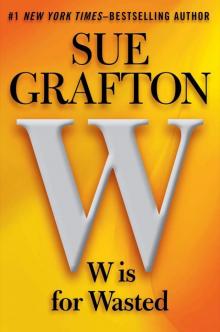 W Is for Wasted km-23
W Is for Wasted km-23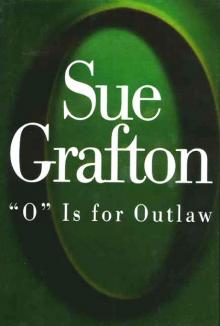 O is for OUTLAW
O is for OUTLAW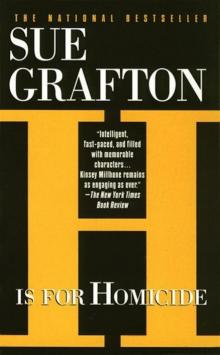 H is for HOMICIDE
H is for HOMICIDE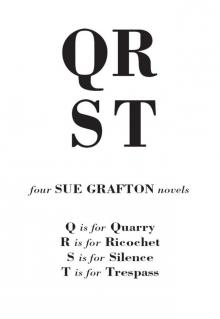 Sue Grafton Novel Collection
Sue Grafton Novel Collection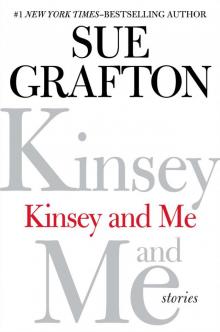 Kinsey and Me
Kinsey and Me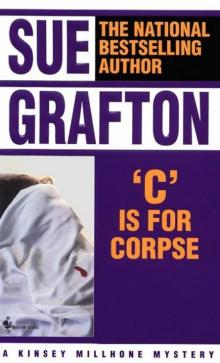 C is for CORPSE
C is for CORPSE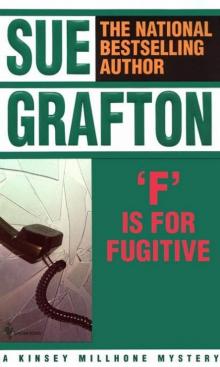 F is for FUGITIVE
F is for FUGITIVE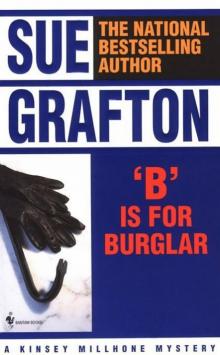 B is for BURGLAR
B is for BURGLAR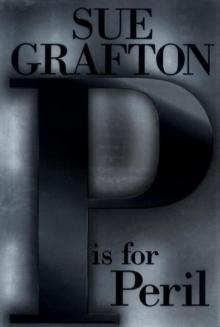 P is for PERIL
P is for PERIL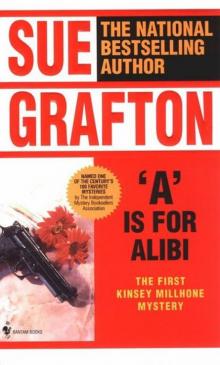 A is for ALIBI
A is for ALIBI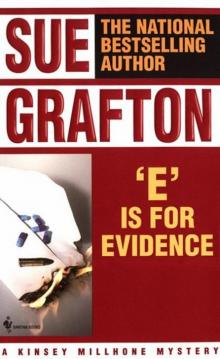 E is for EVIDENCE
E is for EVIDENCE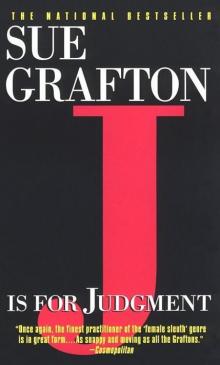 J is for JUDGMENT
J is for JUDGMENT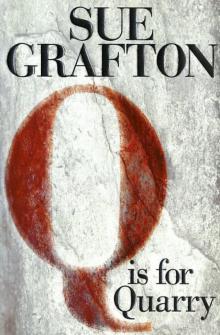 Q is for QUARRY
Q is for QUARRY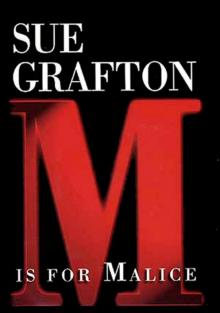 M is for MALICE
M is for MALICE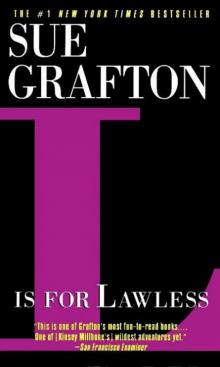 L is for LAWLESS
L is for LAWLESS